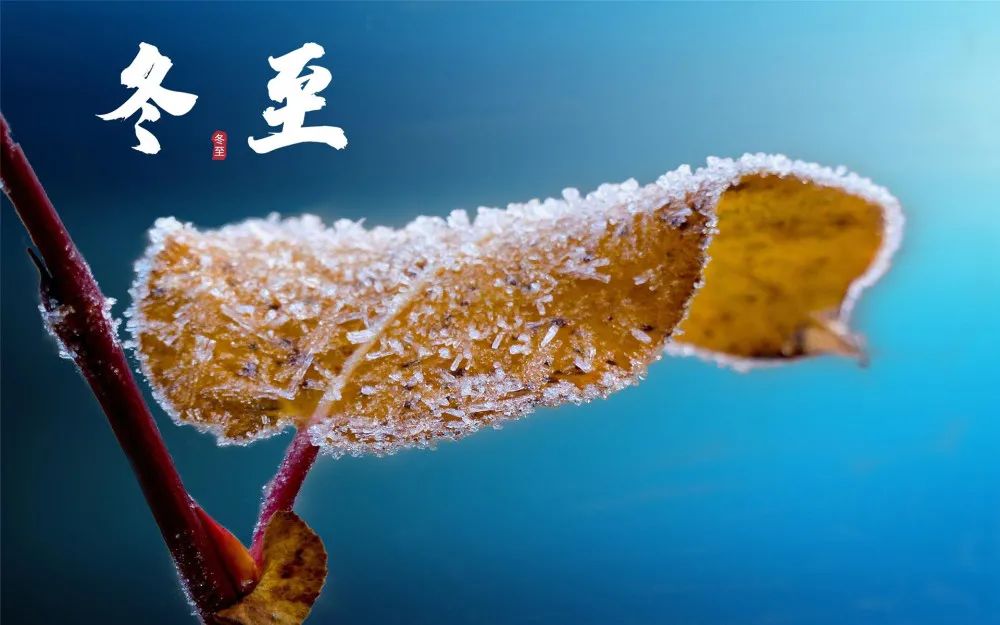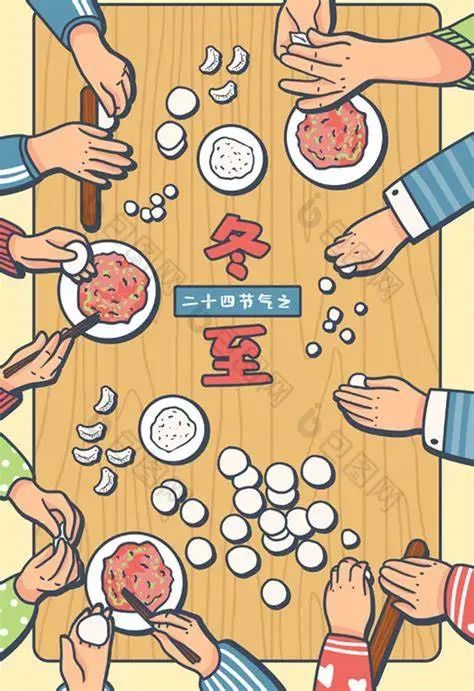Winter Solstice, one of the 24 solar terms, is the exact day when winter comes. "Solstice" means “ultimate”, for the gas of winter preserved so far and it is extremely cold. It contains three meanings: Yin and coldness to the extreme in the coldest day, Yang qi to rise and force cold weather, and the sun to situate the farthest south with the shortest days and the longest nights.
冬至是二十四节气之一,是冬天真正来临的日子。“至”是极致的意思,冬藏之气至此而极。
它包含三层意思:阴寒达到极致,天最冷;阳气始至,上升才逼天气寒彻;
太阳行至最南处,所以昼最短,夜最长。
On the Winter Solstice, the night is long and the day is short. On this day, ancient people worshipped their ancestors and congratulated each other on winter. At the night, people enshrined gods and Buddha and lit a lantern in the bedroom throughout the night. The families sat together with the stove in the bright house, to help collect Yang-qi, which is like New Year's Eve vigil. Therefore, people believe that the Winter Solstice is as important as Spring Festival. The ancients believed that since the Winter Solstice, Yang-qi rises with the day getting longer and longer, and Yang-qi of heaven and earth begins to do gradually stronger, representing the beginning of the next cycle, which is another good day. Also from the date of the Winter Solstice, "count nine", commonly known as "Jiaojiu", starts, and then every nine days as a unit, called "jiu". After nine "jiu", exactly 81 days, that is "Chujiu", which means "out of nine", when the spring flowers blossom.
冬至,夜长昼短,古人这一天要祭祖,然后彼此贺冬。其夜,家奉神佛前并主人卧室燃灯达旦,主家宅光明,攒火围炉,合家共坐,以助阳气,与除夕守夜差不多,故有冬至大如年的这一说法。古人认为自冬至起,白昼一天比一天长,阳气回升,天地阳气开始兴做渐强,代表下一个循环开始,是大吉之日。也是从冬至之日起,就进入了“数九”,俗称"交九”,以后每九天为一个单位,谓之“九”,过了九个“九”,刚好八十一天,即为“出九”,那时就春暖花开了。

In ancient China, the Winter Solstice was regarded as a big festival. There was a saying that "the winter solstice is as big as the year", and there were customs to celebrate the Winter Solstice.
People also celebrate the winter solstice as a festival. In northern China, it is customary to slaughter sheep and eat dumplings and wontons, while in southern China, it is customary to eat rice balls and long noodles on this day. People in different regions also have the custom of worshipping heaven and ancestors on this day.
On the day of Winter Solstice, people in southern China have the custom of eating burnt wax, ginger rice, rice cake, mutton soup, red bean and glutinous rice, and sweet dumplings. In some places in the south, there is a custom of eating tuan (rice balls) which means reunion.
中国古代对冬至很重视,冬至被当作一个较大节日,曾有“冬至大如年”的说法,而且有庆贺冬至的习俗。人们还会把冬至作为一个节日来过。北方地区有冬至宰羊,吃饺子、吃馄饨的习俗,南方地区在这一天则有吃冬至米团、冬至长线面的习惯。各个地区在冬至这一天还有祭天祭祖的习俗。在冬至这天,南方有吃烧腊、姜饭、年糕、羊肉汤、赤豆糯米饭以及吃汤圆等习俗。
南方还有一些地方有着吃冬至团的习俗,有着团团圆圆的寓意。



